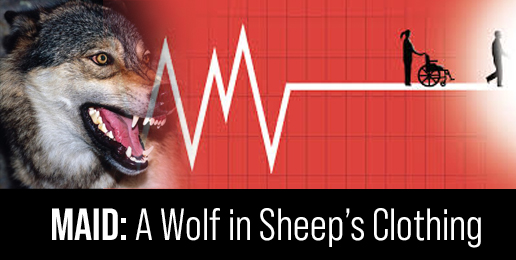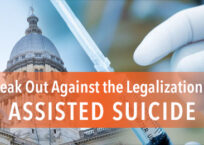
In 2024, the Illinois legislature attempted to pass a bill legalizing physician-assisted suicide, or as proponents call it, “Medical Aid in Dying” (MAID), but it did not advance by the end of the session.
Vulnerable Illinoisans enjoyed a brief respite from this threat to human dignity and life itself, but sadly, the culture of death marches on. Within the first two weeks of the new year, proponents introduced the “End-of-Life Options for Terminally Ill Patients Act” (HB 1328/SB 9) for the 2025 legislative session.
Take ACTION: Click HERE to send a message to your state lawmakers now. Ask them to vigorously oppose these pro-suicide bills, HB 1328 and SB 9.
A Reasonable Solution?
According to Compassion & Choices, a pro-suicide advocacy group, the Illinois law would allow “[a] terminally ill, mentally capable adult with a prognosis of six months or less to live the option to request, obtain and take medication — should they choose — to die peacefully in their sleep if their suffering becomes unbearable.”
The law includes three criteria meant to head off the risk of abuse or coercion, in addition to a list of provisions and regulatory requirements dictating who is eligible, how a physician would become involved, and the details surrounding the administration of the life-ending medication.
To the outside observer, unaware of what’s actually happening where assisted suicide is legal, the legislation appears well-planned, likely to result in the desired outcomes, and even at quick glance, compassionate. After all, wouldn’t we all prefer dying “peacefully in our sleep” to a prolonged illness marked with pain and diminished capacity? Shouldn’t we consider the needs of our loved ones and spare them the emotional, financial, and physical distress associated with a terminal diagnosis?
For those who view life through a self-absorbed lens, the answer is “yes.”
But questions of human dignity and ethics are rarely, if ever, that simple.
Words Matter
As always when discussing questions of worldview, we must define our terms. Take “compassion,” for instance. Compassion literally means “suffering with another,” an ability many in our culture have sadly lost over time. In so much of our modern experience, suffering is something to be avoided, numbed, and pitied, rather than leaned into.
As friends or family members of those who are in pain, we are tempted to avoid what they are experiencing. As sufferers—and suffering will come to many of us—we fight for privacy, autonomy, and our perception of dignity.
Ultimately, either cowardice or pride threatens to deprive us of the beautiful, life-changing experience of true compassion.
And what about “suffering?” We may have an idea in our minds of what it means to face a terminal diagnosis and think, “I would never want to endure that.” But we cannot possibly know how we would respond if that were our reality. Suffering is subjective, and everyone processes and experiences it differently.
What’s more, suffering is often the crucible that forms extraordinary people, those who see the world with a more mature biblical perspective and as a result, are able to develop a deep compassion for others.
The Culture of Death
Proponents of physician-assisted suicide believe themselves to be compassionate, kind, and reasonable, but this is based on self-centeredness and autonomy above all else. An example of how this plays out is in the abortion debate, where a woman’s “right” to bodily autonomy exceeds the rights of an equally human unborn baby.
When self-determination is valued as absolute, vulnerable people become collateral damage. In the case of physician-assisted suicide, not only are the terminally ill sold the lie that is the best use of their autonomy to commit a sanitized version of suicide, but they are also made to believe it is noble to do so. In the process, patients also cause moral and emotional injury to their loved ones and participating physicians, whether they are aware of it or not.
The pressure to remove oneself as a burden to family, friends, and even society through the use of lethal drugs is a reality. As John Stonestreet of the Colson Center has often said,
“The right to die often becomes the duty to die.”
Advocates claim that in every state where physician-assisted suicide has become law (ten, plus Washington, D.C.), there is no evidence of abuse or coercion. However, opponents say otherwise. Regardless, it’s hard to know for sure when all the victims of this policy are dead.
Existing Resources
It’s interesting that, like their counterparts in the pro-abortion lobby, who avoid promoting resources for women who choose to keep their babies, pro-suicide proponents also never talk about hospice and palliative care.
Surely it cannot be that they know this knowledge would hurt their cause by offering an alternative to euthanasia…
Meeting Confusion with Truth
Sadly, many Christians in America lack a biblical worldview on a great many topics, physician-assisted suicide included. Indeed, according to the pro-suicide Compassion and Choices,
“In a 2023 poll, 71% of likely Illinois voters supported this compassionate legislation, and the majority of Illinois physicians also support this option.”
It’s hard to imagine those numbers don’t include believers.
We ought to prayerfully consider what Scripture says on this topic:
- God marks out our days (Ps 139:16; Ps 39:4)
- Counting our days yields a heart of wisdom (Ps 90:12)
- We are not to murder (Ex 20:13)
- We are to speak the truth (Eph 4:25)
- We are to help bear others’ burdens (Gal 6:2)
- God is near to the brokenhearted (Ps 34:18)
- God Himself delivers the afflicted (Job 36:15)
- If we know Jesus, suffering produces hope (Rom 5:3-5)
- For the believer, God is with us in suffering (Ps 23:4)
- In Christ, death has been defeated (1 Cor 15:55)
Some of us will find ourselves facing an unexpected diagnosis at some point, offering an opportunity to live out what God says about us, His image-bearers, and what our lives are for. So too, as we engage with our friends and family, let us be prepared to exhort them based on what God’s Word says about His good design for our entire life, from conception to natural death.
We mustn’t allow the culture of death to spread unchecked in Illinois.
Pray.
Engage others on this topic.
Take ACTION: Click HERE to send a message to your state lawmakers now. Ask them to vigorously oppose physician-assisted suicide.

























